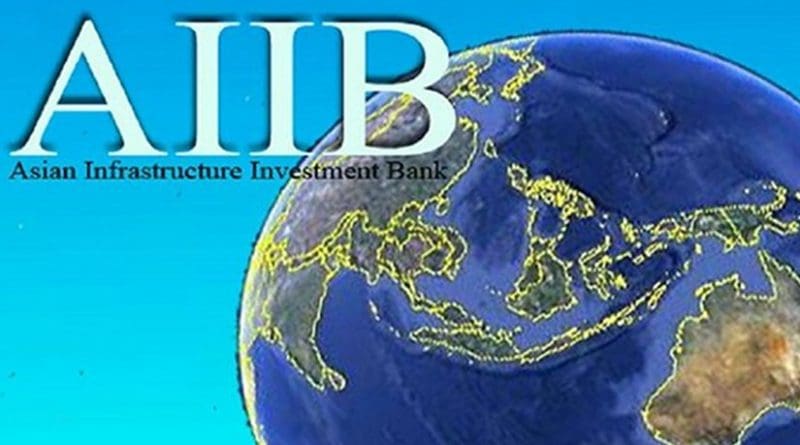AIIB In Indonesia: How Far Has It Come? – OpEd
Indonesian President, Joko Widodo has big plans for Indonesia to make infrastructure a top priority. For example, building ports, railroads, and roads to boost the country’s economic growth up to 7 percent. To achieve this, Indonesia attracted China as one of the main partners.
In the Jokowi era, the economic relations between Jakarta and Beijing were quite strong. As reported by the Indonesian Investment Coordinating Board, investment from China to Indonesia, including flows from Hong Kong, rose 11% to $8.4 billion from 2020. Construction of projects such as the Jakarta-Bandung high-speed rail to be the main mega project.
However, the Chinese government began making a big offer to Indonesia through the Asian Infrastructure Investment Bank (AIIB). According to reports, the Bank has almost 30% of its funding backed by China. In 2014 in Beijing, Yudi Pramadi, Head of Communication and Information at the Ministry of Finance of the Republic of Indonesia, signed a Memorandum of Understanding (MoU) with 21 other countries. In the deal, AIIB would supported infrastructure development in Indonesia such as energy, transport, telecommunications, agriculture and rural infrastructure, sanitation, environment, logistics and other sectors,
In mid-2016, Indonesia received the first loan from AIIB and has promised to disburse $216.6 million in financing into a $1.743 billion project to improve access to urban infrastructure and services in slum areas in 154 cities in central and eastern Indonesia. A month earlier, Indonesia’s Finance Minister, Bambang Brodjonegoro said that Indonesia would propose no less than six infrastructure projects for AIIB financing for 2016 and 2017 with a combined cost exceeding $2 billion.
This starting point has made the AIIB even more massive in Indonesia. In April 2021, the Asian Infrastructure Investment Bank (AIIB) in collaboration with PT. Satellite Nusantara Tiga (PSNT), based in Jakarta, to develop telecommunications satellites in Indonesia. The approved financing reached USD 150 million for the Multifunction Satellite PPP Project. This is reflected in the 10,500 villages that do not have a network connection to the optical cable in the countryside. On the other hand, this satellite will provide much-needed broadband internet services to more than 149,400 unserved public service points, including schools, hospitals, and local government locations in some underdeveloped areas in Indonesia.
According to Adi Rahman Adiwoso, CEO of PSNT said, “For millions of people, this is a very important project,” he said. “This will bring digital inclusion to students in nearly 94,000 schools through online education, increase connectivity for around 3,700 health centers, and connect 3,900 local governments with their headquarters in Jakarta.” In the same sector, AIIB also approved a loan of USD310 million to PT Perusahaan Listrik Negara (Persero) for the East Java & Bali Power Distribution Strengthening Project.
In the period 2018-2020, the Board of Directors of the Asian Infrastructure Investment Bank (AIIB) has approved a loan of USD 248.4 million to the Indonesia Tourism Development Corporation, guaranteed by the Republic of Indonesia (Indonesia), to support the Mandalika Urban and Tourism Infrastructure Project. This will be AIIB’s first standalone operation in Indonesia and AIIB’s first tourism-related infrastructure investment.
AIIB also played a major role in providing loans of USD 1 billion during the COVID-19 pandemic. The first loan, totaling USD 750 million and co-financed with the Asian Development Bank (ADB), will be used for the business sector, including small and medium enterprises, support the poor, and strengthen the health care system. An additional USD 250 million will be used to cover readiness for testing, surveillance, prevention and treatment of COVID-19, as well as hospital readiness.
AIIB Deputy Chair, DJ Pandian said, “The COVID-19 pandemic has forced many developing countries to make trade-offs difficult to meet the urgent needs of their people. AIIB’s support for Indonesia also contributed to the government’s efforts to navigate these challenges during extremely uncertain times.”
With this, there are indeed many criticisms made by Indonesian political researchers who are skeptical of the acceleration of Chinese products in Indonesia. Starting from poor quality to the debt-trap. However, so far AIIB has contributed greatly to development in Indonesia.
Apart from that, Jokowi through its strategic plan to develop Indonesia is quite helped by programs or products produced by China. Moreover, Indonesia needs to launch other infrastructure programs so that it can become a developed country or an upward developing country such as the United States and Singapore.
*M Habib Pashya, Researcher at Center of Indonesia-China Studies

